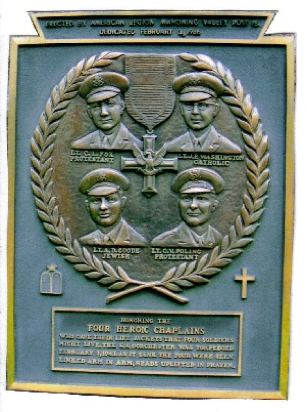THE FOUR CHAPLAINS
In front of the Poland’s American Legion Post 15 Building on Cortland Street is a stone monument honoring the four chaplains who went down with the U.S. Troop Ship Dorchester when she was torpedoed that bitterly frigid pre-dawn morning of February 3rd, 1943. The Dorchester was in a convoy moving steadily across the Atlantic waters from Newfoundland toward an American base in Greenland. It was crowded to capacity, carrying 902 service men, merchant seamen, and civilian workers.
The ship’s captain was concerned as German U-boats were known to be prowling the sea lanes. He ordered his passengers to sleep in their clothing and keep their life jackets on. Many disregarded the order because the jackets were uncomfortable.
Then, only 150 miles from Greenland, disaster struck. The German submarine U-223 spotted the Dorchester and three torpedoes were fired; one hit amid ship and far below the water line. Orders were given to abandon ship and within 20 minutes the Dorchester slipped beneath the icy waves. There is no doubt that many hundreds of the troops packed into the lower parts of the ship must have been lost in the original explosion. With the dense and irratating smoke of the blast still eddying through the passageways many of the men became disoriented. Through the pandemonium four Army chaplains brought hope to the survivors of the blast.
Those chaplains were Lt. George L. Fox, Methodist; Lt Alexander D. Goode, Jewish; Lt. John P. Washington, Roman Catholic; and Lt. Clark V. Poling, Dutch Reformed. Quickly and quietly, the four chaplains calmed the frightened, tended the wounded and guided the disoriented toward safety. When there were no more life jackets in the storage locker, the chaplains removed theirs and gave them to four frightened young men. When giving their jackets, Rabbi Goode did not call out for a Jew; Father Washington did not call out for a Catholic; nor did the Reverends Fox and Poling callout for a Protestant. They simply gave their life jackets to the next man in line.
As the Dorchester went down, survivors in nearby rafts could see the four chaplains – arms linked and braced against the slanting deck. Their voices could be heard offering prayer for the safety of the survivors.
Of the 902 men aboard the Dorchester, 672 died, leaving 230 survivors. When the news reached America shores, the nation was stunned by the magnitude of the tragedy and heroic conduct of the four chaplains. It was 64 years ago that Fox, Goode, Poling and Washington passed life’s ultimate test. In doing so, the four chaplains became an enduring example for extraordinary faith, courage and selflessness. A one-time only posthumous Special Medal for Heroism was authorized by Congress and awarded by President Eisenhower on January 18, 1961. The Post 15 monument was dedicated by the American Legion on February 3, 1986, being 43 years after the brave chaplains sacrificed their lives to save four American soldiers on the sinking U.S.T. S. Dorchester.

Bronze Plaque erected in front
of the Poland American Legion
